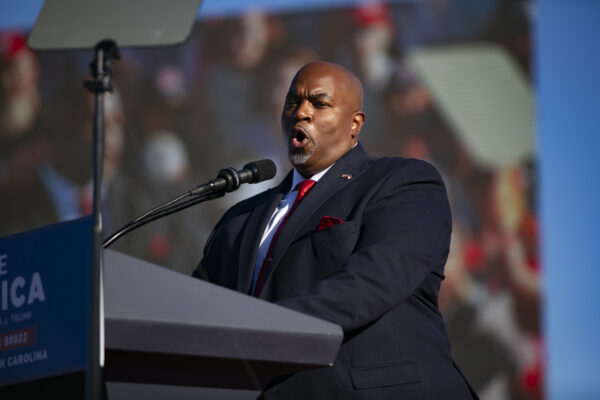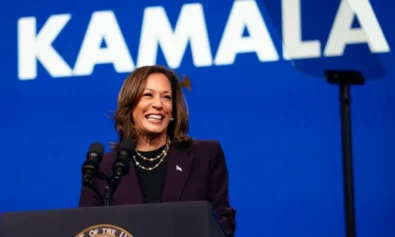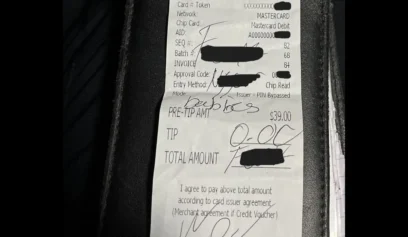North Carolina’s first Black lieutenant governor, a leading Republican gubernatorial candidate for the 2024 election, has a history of saying negative things about the civil rights movement.
His past comments directly contradict a campaign strategy he’s used over the past few years that touts his hometown as an epicenter for the movement and his heralding of some of those local leaders.
In a deep dive into the views of Lt. Gov. Mark Robinson, CNN compiled a collection of public comments made over the past five years where the GOP frontrunner disparaged the civil rights work of leaders like Dr. Martin Luther King Jr., Ella Baker, Bayard Rustin, Fannie Lou Hamer and those from his home state.

He compared the work of civil rights activists with the goals of communists.
Much of his rhetoric included claims that the movement that abolished legal segregation, established voting and housing rights, and integrated public schools was a communist ploy to “subvert capitalism.” He said the aims of those that pushed the agenda forward were “to subvert free choice and where you go to school and things like that.”
Years before being elected as the 35th lieutenant governor of his state, his first political office, the Greensboro native started criticizing the goals of the civil rights movement.
One example was in March 2018. He said as a guest on the “Politics and Prophecy” podcast with Chris Levels, “So many things were lost during the civil rights movement.”
Robinson asked his host to look at the sit-ins that students did in North Carolina at stores like Woolworth. While explaining that America operates in a “free market” system, he lambasted the decision to sit at a counter where Blacks would not be served and demand that whites take their money.
“[So, you] sit at the lunch counter and you demand these people to take your money. How crazy is that? That’s not what you do in a free market system,” he said. “What you do is say ‘Hey, guys, these guys don’t treat people fair. Do not eat here. You go to a place where everybody can eat and let’s see who does the best. That’s what you do in the free market system.”
In other comments, Robinson said integration drained the community of dollars that used to circulate within it.
He said, “The civil rights movement destroyed hundreds of very well-run Black schools. They destroyed Black businesses across the nation. Once businesses became integrated right here in Greensboro, once Woolworth became integrated and the other cafeterias, white cafeterias became integrated, Black folks stopped going to the Black businesses. And they went out of business.”
“And they went out of business because we start [sic] giving our dollars to people who didn’t want them to begin with or want them on their terms,” he added. “If we had not listened to those communists and had put our dollars in our pockets and built up our society, we could have drawn well-meaning Whites to our side and run Woolworth out of business instead of the other way around.”
Critiques of Robinson’s statements flooded Twitter. Social media pundits said his comments were ill-informed and failed to acknowledge how he benefited from the movement.
“The Black Republican Front Runner in the NC Governor’s race. Lt. Gov. Mark Robinson feels the civil rights movement in the 60’s and the sit-ins at the lunch counters was all BS,” one woman said. “As if he could survive one week of Jim Crow.”
“Douche, Mark Robinson, wouldn’t have the right to vote let alone RUN for governor in NC without the Civil Rights Movement. WTF,” Twitter user Micheline S wrote.
Petty LuPone tweeted, “Mark Robinson is trying to outdo his mentor, Clarence Thomas.”
“We are turning out Uncle Toms by the dozens lately,” Sombria Coley posted. “I really think these guys (Clarence Thomas, Tim Scott, and Mark Robinson) need a Civil Rights History Class.”
CNN points out that some of his rhetoric does not align with the recent celebration of his hometown as the “epicenter of the civil rights movement.”
After CNN’s report went live, Robinson posted a video on Twitter featuring him with Black Republican activist Clarence Henderson, who was a Greensboro Woolworth lunch counter sit-in participant on the second of the demonstration in 1960. Robinson obtained Henderson’s endorsement during the one-on-one conversation.
As a guest last June on the Nikita Koloff “The Man Up” podcast, Robinson continued to speak about the merit of the Woolworth sit-ins, marveling at how it took him some time to appreciate the sacrifice those Greensboro Four, SNCC, and the NAACP Youth division in the 1950s and 1960s made for equality.
“I used to sit at that counter and eat that hot, eat, eat my food. My feet wouldn’t even touch the floor when I sat on the stool ‘cause I was so small. And I sat at that counter and when I think back on it now, I think I had no idea what happened there as a kid. I had no idea the cost that people had to pay for me to be able to come in there and sit at that counter. And that’s just always been something that’s been very striking,” Robinson said.
More evidence of Robinson’s right-wing views on a number of topics has begun to emerge since he declared his candidacy for the governor’s seat on April 22.
Like the unearthed civil rights comments, Facebook posts from 2018 regarding the survivors of the Parkland, Florida, school shooting that killed 17 have emerged.
While many disagree with Robinson on many issues, including his take on Parkland victims, who he called “spoiled, angry and know-it-all children, data supports his claims about the impact of integration on Black businesses.
For instance, after integration, the Negro Leagues Baseball, which led to the creation of various Black-owned businesses such as hotels, salons, restaurants, clubs and insurance companies, was destroyed.
In 1865, just after the Emancipation Proclamation, 476,748 free Blacks — 1.5 percent of the U.S. population–owned a .005 percent of the nation’s total wealth. Today, about 156 years after the abolition of slavery, 40.1 million Black Americans — 12.1 percent of the population — possess 4 percent of the national wealth.


